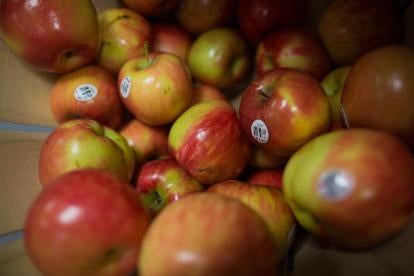Victoria’s Supreme Court of Appeal has granted Apple and Pear Australia Limited’s (APAL) appeal in relation to their dispute with Pink Lady America LLC (PLA) over the refreshed “flowing heart” Pink Lady composite trade mark used in association with everyone’s favourite apple variety.[1],[2]
The dispute brought to light a number of crunchy commercial contract issues relating to agreements between APAL, PLA and the International Pink Lady Alliance (Alliance) that dealt with rights to particular trade marks registered in Chile (one of the key growing regions for the Cripps Pink and Rosy Glow apple varieties which are sold under the “Pink Lady” brand). PLA left the Alliance in June 2010.
The Alliance was established in order to promote a consistent global marketing strategy for the Pink Lady brand. Patent and trade mark rights were exclusively licensed to a number of different entities in different territories by APAL’s predecessors in title (the Australian Apple and Pear Grower’s Association Inc, and the Department of Agriculture for the State of Western Australia).
The current dispute related to an “Option Deed” which was entered into by APAL and PLA against a background of difficulty in getting trade marks registered in Chile. PLA, on a frolic of their own, applied for a number of trade marks in late 2006 (while negotiations for another trade mark agreement were on foot). The Option Deed provided for PLA to assign these trade marks to APAL who would then licence them back to PLA on an exclusive, perpetual, and royalty-free basis for PLA to use, and to licence others to use, the marks in relation to the export of Cripps Pink apples from Chile to North America.
Relations between APAL and PLA continued to sour and ultimately lead to the filing of proceedings. PLA alleged that the terms of the “Option Deed” which specifically referred to particular trade marks also implicitly encompassed any future logo to be adopted internationally for the Pink Lady brand.
While at first instance, Justice Croft found that in light of surrounding circumstances (including knowledge of both parties that a new, refreshed mark was in the process of being developed) that there was an implied term that the licence “would subsist over any refreshed trademark, whenever introduced“, the Supreme Court of Appeal has overturned the decision, finding in APAL’s favour that no such term can be implied into the Option Deed.
Justice Tate’s judgment serves as refresher on the legal principles of contractual construction (including when extraneous materials may be referred to in interpreting a contract) and the matter is a reminder that even the best laid trade mark management plans may not be sufficient to prevent disputes from arising.
[1] With no offence meant to the Granny Smith, Royal Gala, Jazz or Fuji apple fans out there.
[2] Apple and Pear Australia Limited v Pink Lady America LLC [2016] VSCA 280.



 i
i


